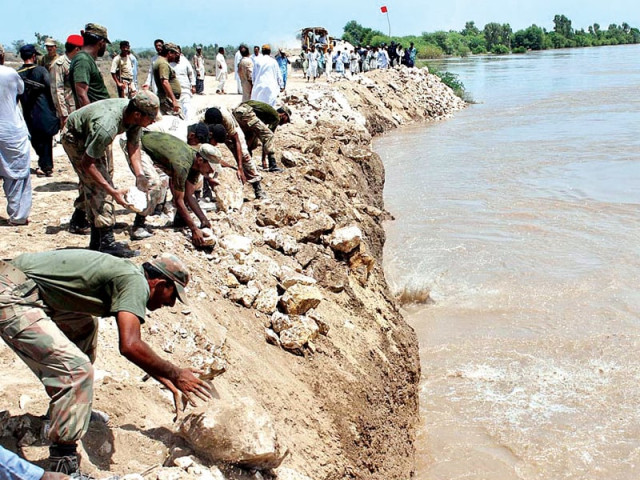Disaster risk reduction: ‘Weak infrastructures, embankments along Indus River pose risk of flooding in Sindh’
Experts believe lack of awareness of environmental laws puts the Indus eco-region at risk.

Pakistan Army officials dump stones to strengthen the embankment along River Indus at Aqil Agani. Officials claim that encroachments and weak infrastructure along the riverbed weaken the embankments which cause floods. PHOTO: FILE
The event was organised as part of a campaign, The Rights of Indus to Survive, launched by Legal Rights Forum in collaboration with ActionAid Pakistan. The aim is to sensitise all stakeholders to address the matter of disaster preparedness in relation to Indus River, said Legal Rights Forum executive-director Malik Tahir Iqbal.
“During the campaign, consultative workshops and network meetings will be arranged to address core issues, including shortage of water in the river, coastal infrastructures, encroachment of lands and lack of political will,” said Iqbal.

The participants believed that encroachment, deforestation, and weak infrastructure were among the few causes of flood in Sindh. “Natural flow of water is blocked because of encroached settlements that have expanded over time and even acquired legal status,” said Fakhira Abro, programme manager of ActionAid.
Despite the existence of laws to protect rivers and forests, many people are unaware of them. Consequently, the Indus eco-region keeps suffering, said Qazi Ali Athar, an environmental law attorney.
Athar was of the view that Indus River is a lifeline for the masses, thus protecting it from the release of toxic waste was a matter of urgency. “The lifeline, however, is being treated as gutter line,” regretted Athar.
“If you cause damage to the environment, be ready to face the consequences,” said Barrister Shahida Jamil - chief guest on the occasion.
Preserving forests
Athar emphasised that people should register complaints through vigilance committees to protect forests. These committees work under the district and sessions judges in 24 districts of Sindh.
Deforestation was one of the causes of sand storms, said Jamil, adding that forests currently occupied hardly four-and-a-half per cent of the land - a significant decline from the 25 per cent figure at the time of independence.
Water sharing
Sikander Brohi, the Participatory Development Initiatives executive-director, said that water distribution had been the “bone of contention” among provinces since the 20th century. Brohi said that the birth of the Indus River System Authority (Irsa) in 1991 “was not a good start” as it had never been implemented. “Water is being distributed under a three-tier system which is a violation of Irsa accord.”
On the lack of a water audit system, he said that provinces inform how much water they use every year on the basis of self reporting. “Steal as much as you want, nobody bothers to question.”
Abdul Khaliq Junejo said that people living in katcha areas along Indus River migrate because of two reasons - either there is no water at all or there is a flood. He said that under the three-tier formula, the provinces get water according to their “historic uses” but during Zia regime whatever water share the provinces could get hold of, it became their right.
Green courts
A year and a half ago, Sindh High Court chief justice Mushir Alam had announced the constitution of special green courts at district courts level and a special bench at the SHC to deal with litigation on environment-related matters.
“Courts were notified but they are not functioning,” said Athar. A tribunal - only one for both Sindh and Balochistan - was also to be formed to redress such complaints but it’s not operational, he added.
Published in The Express Tribune, July 26th, 2013.



















COMMENTS
Comments are moderated and generally will be posted if they are on-topic and not abusive.
For more information, please see our Comments FAQ